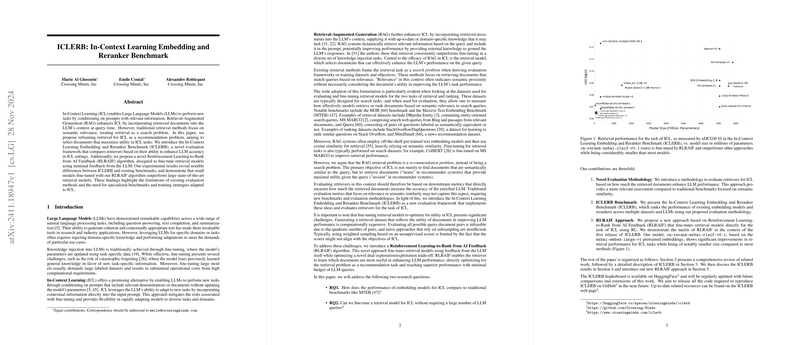An Evaluation of ICLERB: Leveraging Novel Methods for In-Context Learning Optimization
The research documented in this paper addresses the limitations of conventional retrieval frameworks for In-Context Learning (ICL) by proposing a reformulation of the retrieval task as a problem of recommendation rather than search. In-Context Learning offers the potential to adapt LLMs to new tasks without necessitating parameter adjustments by leveraging relevant demonstrations or documents in input prompts. Traditional Retrieval-Augmented Generation (RAG) complements ICL by retrieving documents based on semantic relevance. However, this approach is deficient in optimizing the utility of retrieval, central to which is the performance enhancement of LLMs specific to the task.
The authors put forward the In-Context Learning Embedding and Reranker Benchmark (ICLERB), a framework that facilitates the evaluation of retrieval systems by their effectiveness in improving ICL task performance. This benchmark is accompanied by the introduction of a novel algorithm, Reinforcement Learning-to-Rank from AI Feedback (RLRAIF). This algorithm fine-tunes retrieval models dominantly through minimal LLM feedback, efficiently improving LLM performance in ICL tasks over existing state-of-the-art models, evidenced by strong nDCG metrics.
Key Contributions and Methodological Advancements
The paper delineates several significant contributions:
- Alternate Evaluation Methodology: By framing retrieval in ICL settings as a recommendation problem, the authors propose evaluating document retrievers based on their ability to enhance LLM accuracy directly, thus providing a departure from traditional semantic relevance metrics.
- ICLERB Benchmark Deployment: As a pioneering framework, ICLERB equips researchers with tools to rank retrieval models against novel methodologies that emphasize practical utility in terms of LLM task enhancements.
- Introduction of RLRAIF: By adopting a reinforcement learning approach, RLRAIF positions itself to fine-tune retrieval with LLM feedback effectively. This highlights a strategic adaptation to acquire high-utility documents in a limited computational budget, outperforming larger models primarily through intelligent data acquisition and adaptation tactics.
Experimental Observations
The experimental results are illuminating. It is shown that fine-tuning retrieval models with the RLRAIF algorithm yields a superior performance over larger, pre-existing retrieval models. Noteworthy is the performance of the cm-rerank-mxbai-rlaif-v0.1 model which, despite its smaller size, managed to surpass substantial models on nDCG scores by exploiting the RLRAIF methodology effectively. These results are underscored by broad cross-validation evaluations using various datasets and LLM models, adding to their validation's robustness.
The paper contrasts the ICLERB results with the Massive Text Embedding Benchmark (MTEB), underscoring instances where traditional benchmarks may not capture the retrieval model's utility in ICL settings. Notably, models like SFR-Embedding-2_R present higher efficacy within ICL contexts as compared to their MTEB evaluations, denoting the threshold advantages of bespoke benchmarking frameworks.
Implications for Future Research
The findings carry profound implications for both theoretical refinements and practical iterations in AI research. From a theoretical perspective, it challenges foundational assumptions about retrieval tasks in ICL settings, presenting a case for utility-focused benchmarks and methodologies. Practically, implementations such as RLRAIF, which navigate data acquisition through strategic LLM feedback utilization, pave the way forward for creating highly efficient ICL systems.
Further exploration could involve amplifying ICLERB to encompass more diverse datasets and document types, extending into broader RAG scenarios. Additionally, there is scope for extending RLRAIF to larger pre-trained models, juxtaposed against larger budgets to fully map its potential benefits across variations in data complexity and model architecture.
In conclusion, by redefining retrieval methodologies for ICL via ICLERB and RLRAIF, this paper provides a nuanced perspective on optimizing LLM performance through more relevant contextual learning strategies. The proposed methodologies demonstrate substantial improvements over traditional techniques, offering a robust framework for future advancements in AI retrieval systems tailored to dynamic learning environments.
